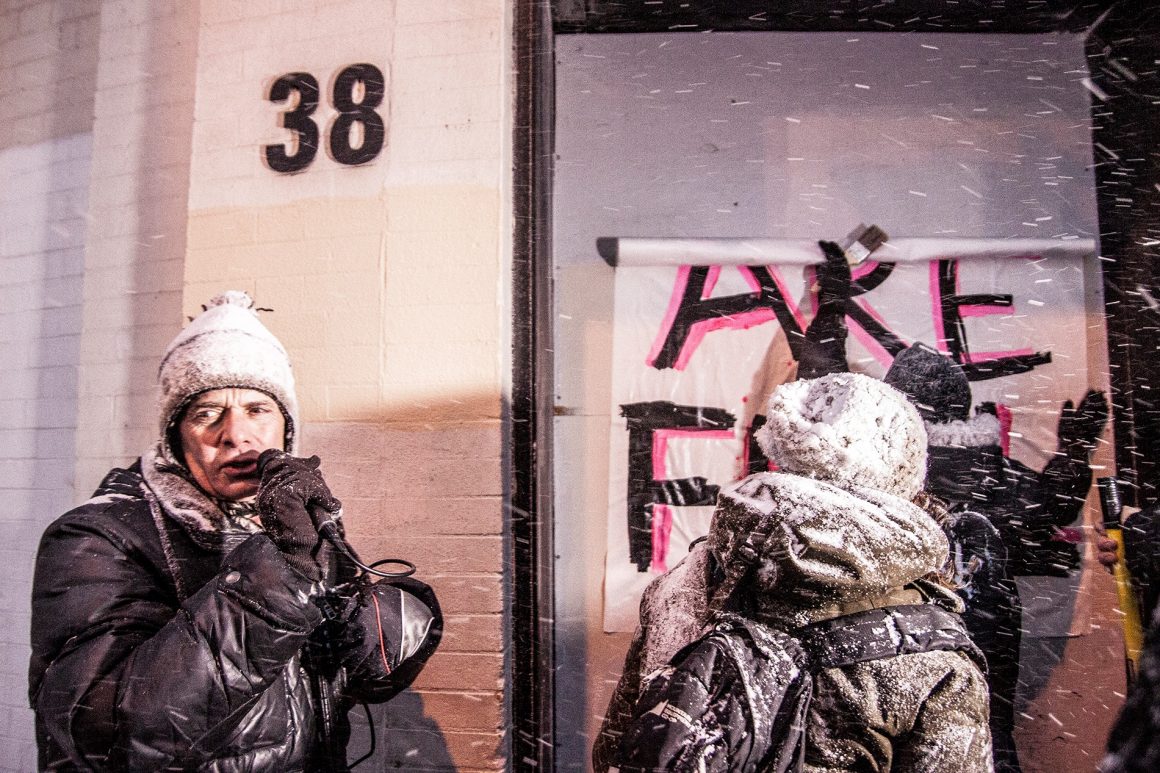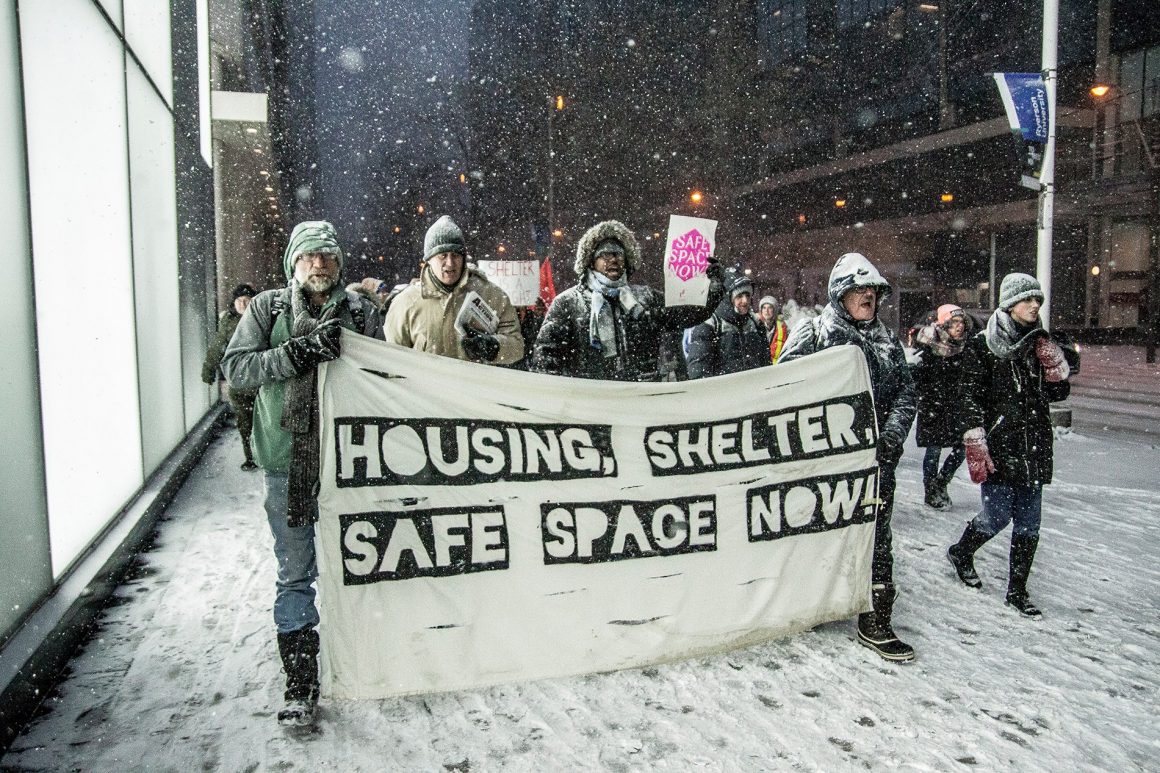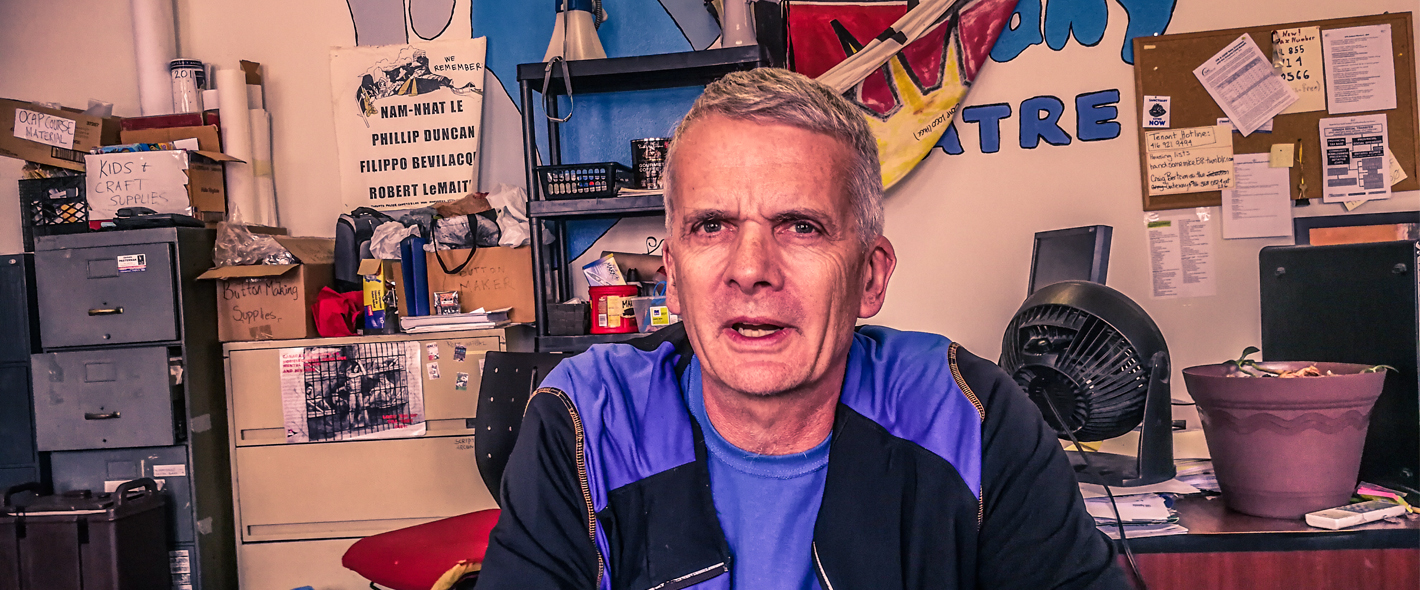John Clarke is a well-known figure in the political left in Ontario, and across Canada. As he gets ready to retire, later this year, from 30 years as organizer for the Ontario Coalition Against Poverty (OCAP), Dave McKee interviewed John about the development, opportunities, and challenges of the anti-poverty organizing and the working class movement in Ontario:
I’d like to start with a personal question. Most people probably think of you in terms of your anti-poverty work with OCAP, but your political work covers a longer and larger spectrum. Can you share some of your personal history as a political activist?
I grew up in Wimbledon in south-west London – the tennis centre – and there’s a working class there but it doesn’t have the same clout as it would in other areas. The first activist stuff I did was in secondary school. I got involved with a group called the School’s Action Union and we did some pretty defiant actions. I don’t know that we won any major reforms but we were challenging the discipline, the school uniforms, and the really regimented stuff that was still very dominant in the schools then. So it was focused on school-based issues, but through that there was a link with trade unionists, the squatters’ movement in London, and so on.
I left school with a Grade 10 education equivalent and took a series of jobs, and through those jobs I got involved in one way or another in some trade union activity.
I immigrated to Canada at 22, and took a job working at the Westinghouse plant in London, Ontario, and got involved with the United Electrical Workers, Local 546, where I was a steward and a member of the union’s executive. Then in 1982 the international recession was setting in and I was laid off, so I got involved initially in an unemployed committee within the union local. The plan we had was to reach out to other locals to form unemployed committees within those locals and bring them together into a city-wide council, and then reach out to the unorganized. That didn’t work terribly well, so with the agreement of the UE local, and the lukewarm agreement of the London and District Labour Council, we managed to pull together a meeting to directly form an organization, that was called the London Union of Unemployed Workers and which was open to all unemployed people in London. We had support from a number of unions, although we suffered a rift with the labour council, which had a much more right-wing leadership in those days. It was a fascinating period, because the attack on us was part of a bigger attack on the left within the whole trade union movement in London, where they purged the labour council executive of all the left leaning members. Then they discovered that they didn’t have the same level of energy they used to have, and asked a few of us to sort of come back. So we were partly rehabilitated by the labour council and got back support on a kind of case-by-case basis.
OCAP has been an important organization in Ontario for almost 30 years. Tell me a little about how the organization came together.
I was active in the London Union of Unemployed Workers from 1983 to 1990, and we worked with people in various cities, including the Toronto Union of Unemployed Workers, on something called the March Against Poverty Committee. We were demanding a 25% increase in the social assistance rates. This was 25% more than the levels then, which was much more than the rates now, but it was still poverty. The Liberals had commissioned a study – which governments always do when they don’t want to do anything – and they had produced a body of fairly good recommendations, including a call for a substantial increase in social assistance rates. The NDP caucus at Queen’s Park got quite enthused and we got lots of support, and we were able to put together a three-pronged march – from Windsor, Sudbury and Ottawa – over a three week period and converge of the legislature. That led to the formation of OCAP, in November 1990.
After the march, we operated with a steering committee and it organized a campaign of disruption against Peterson’s 1990 election campaign, using the slogan “Down with the Poverty Premier!” So the founding conference of OCAP was born out of a general level of activity, and people came from a whole range of cities. The conference, in many ways, took the form of a debate over the way forward, and there were two models advanced. One was a kind of concerned citizens organization that would lobby and educate and draw its members from a broad range of society. I was associated with the other wing, that was arguing for a direct membership organization of poor people, or at least affiliation to a provincial structure of that, with the goal of social mobilization rather than lobbying and education.
So, the two models were very clearly set out by both sides, and it really came down to the question of the election of the first organizer. Each side had a candidate and as soon as the election result came in, about a quarter of the room got up and walked out. And I must say that the 25% that walked out made absolutely the right choice – it was a really healthy clearing of the purpose and tactic of the organization. We elected an executive committee that was quite representative of the province, and we began the job of organizing.
We expected that we would continue to have a strong level of support from the NDP caucus and, through that, with the trade unions. This would have provided the level of resources to really put in place a province-wide structure, with local affiliates to OCAP.
But the NDP was now the government, and their enthusiasm for a militant poor people’s organization took a bit of a nose-dive. So the resources weren’t there, and after about a year of me as the first organizer living out of a Greyhound bus I had to acknowledge that it wasn’t going to happen that way, and we fell back on organizing within Toronto.

How has being rooted in a particular community – specifically the poor tenants and homeless people in Toronto’s downtown east – helped to sustain the work of OCAP over the years and in different conditions? Have there been challenges in maintaining that rootedness? Has the organization’s commitment to direct action casework been important to this?
The direct action stuff covered many fronts, but it was largely focused on the welfare system. Initially, we’d ask for something, they’d refuse, and we’d take a big delegation to the office. But that tended to recede because they have a smart strategy – they developed the skills at making tactical concessions that have made it difficult for us to maintain that same level of direct action. Also, different situations lead to different levels of mobilization – Mike Harris was a peak time for us. Cases still come up, and we do them all the time, but not on the same level.
Before our time, the Toronto Union of Unemployed Workers had also been rooted in this community, so there was a bit of a history to draw on. But there’s always been this double side – in a certain sense, we’ve been a sort of catalyst for province-wide organizing but in another sense, we’ve been an organization from downtown Toronto East. And the balance has been difficult to maintain at times – during the Harris years, we were provincially focused – but we’ve always drawn back to this specific community. In the last while, we’ve been putting on these speaking series that have been really something – it makes you think of what Gramsci said about the “organic intellectual” – where you’re bringing out very poor people and having these strong political discussions. It’s something that’s helped us to maintain that critical rootedness in the community.
The working class is more than just people who are working, and the labour movement is more than just trade unions. What role do organizations of poor and homeless people play in the broader labour movement? What are some of the tensions that arise?
Well, we fly in the face, clearly, of the business model of trade unions. We’re organizing a section of the working class that the pork chopper would have no interest in, whatsoever. Every positive relationship we’ve built with trade unions, trade union members and trade union leaders, has always been based on an important recognition of the fact that there is a working class that is broad. Rosa Luxemburg wrote this incredible piece about a homeless shelter in Berlin where people were poisoned because of the food they were given, and she denounced those who said this was a humanitarian issue, and insisted it was a class issue.
The reality is as you confront this neoliberal austerity agenda, an ever-growing number of people are forced onto the periphery of the workforce as the most precarious and vulnerable workers, and beyond that a section of people is forced into extreme poverty and literal destitution. It’s something that trade unions ignore at their peril – without casting a wide net, we won’t build a movement that defends its gains and leaves nobody behind. It’s amazing even how many trade union activists see organizing the poor as a kind of humanitarian endeavour rather than a class issue.

Thinking back to 1989/1990, how has the condition of poor tenants and homeless people changed over the years? Have these changes had an impact on the work and organization of anti-poverty groups? Can you project some key future directions and challenges for the movement?
If OCAP had been formed in 1960, we’d be talking about the social programs we’d won and the reforms that were achieved. Today, we’re talking primarily about the rear-guard actions we’ve fought against a worsening attack. I think we’ve won important victories and we’ve shown that resistance is possible, but we’ve done so in a situation where we’re being driven back. I fear that retreat is not entirely over.
A progressive government today is doing things that a right wing government would have done years ago. And obviously we’re in the throes now of a completely new and changed situation.
The worsening situation has opened up possibilities, in that there’s organizing we’ve been able to do, but we’re so far away from the mass movement that’s needed in this situation. What we talk about is only a down payment for what we need to do in the future. But, the interesting thing is, we confront people who are not activists, so you realize that most people have a very practical sense of organizing and mobilizing. The thing they want to know is, “Is it going to work?” It’s quite pragmatic but also quite reasonable. And there’s a general sense that governments are going to do what they are going to do, and they can’t be stopped.
But where we’ve always scored was where there was a sense of possibility. So, we saw a real high point in terms of our mobilizing when Harris announced he was going to cut social assistance rates by 22.6%, but then we saw a downturn once the cut went through and we couldn’t stop it. During the period where we were going after the Special Diet Allowance, we were going after a benefit that the government didn’t intend to make available and we found a way to get it. People had to fight for it, though, and it led to people coming out and mobilizing who’d never mobilized before. We had a whole organization in the Somali community, and even an office in the Somali community, called OCAP Women of Etobicoke. So, it was there, and today we’re on the cusp of looking for those kinds of openings.
For us, there have been a couple of flash points in the last while. One was the homeless crisis, and the sheer horror of the shelters, and that’s going to be compounded and worse. But the other thing that’s coming is the 100-day review of the welfare system, and that’s going to be horrible. They’re going to come out with something that’s impossibly workfare-based, that will involve a huge “fraud” crackdown, and it’s linked to their strategy around the minimum wage and workers’ rights. They want to create a low-wage workforce, and they want to create an income support system that just funnels people into the desperate scramble for those jobs. They just want people to conclude that anything has got to be better than being on social assistance. This especially includes people with disabilities, who they are really looking to go after. They’ve done this in the UK, using an argument that coopts the language of disability justice and attacks people with disabilities. That 100-day review is due by November 8, and I predict it is going to be a defining moment in the implementation of the austerity agenda.
Are there any general directions you look toward, for the working class movement, based on your work as an anti-poverty organizer?
One thing that really has to be recognized is just how volatile the mood of grievance and anger is. Nobody saw the student walkout coming – things can happen that you never saw coming, and that you never predicted. Sometimes, you expect a fight to happen and it doesn’t happen, but other times you’re surprised the other way. Even the World Bank and the IMF are talking about that extreme volatility. If you just assess capacities arithmetically, but the wild card is there – things can change exponentially, not just arithmetically.
Clearly, the labour movement is not even as strong as it was during the Harris years, and it was weaker then than it had been. The possibility of something like the Days of Action happening immediately seems remote, but that can change quickly.
The second thing is that people look to the Days of Action as a model to be emulated, but we have to understand that while it was an important and inspiring episode, it was bureaucratically controlled, and it was called off. So particularly in the context where there isn’t much of a lead being given, we’ve got to look to organize locally and we’ve got to pull together a base. There are important and impressive struggles that are happening, like the Fight for $15 and Fairness, and the energy that went into the student walkout, but I do think we’re going to go through a bitter period. I don’t predict we’ll be able to convince the Tories to scrap their new poor law, and I’m frankly not confident that we will convince Ford to not go ahead with scrapping the minimum wage increase and killing the reforms.
It’s got to come from the base, but what’s also got to be understood is that while the working class is much broader than the trade unions, the trade unions have a vital role to play. Without the use of the political strike weapon, I don’t think we can put anything onto the streets that is anything more than a police problem. Unless we can really seriously start shutting down the economy, I don’t think we can stop Ford. We may delay things, and even win minor victories, but the fundamentals of his agenda will go through unless we have a united working class movement that has the perspective of rendering the province ungovernable and defeating this government.
But, if you had thriving anti-cuts committees and assemblies that were actually directing local struggles, and these decide they are going to do a day of action in a community, then the equation changes.
And now back to you. You are retiring later this year, from paid work but not from political work. What does the future hold for you?
First of all, I’m stepping down as an OCAP organizer but not as an OCAP member. I plan to be very active in this organization. But, also, I’ve reached the point where I can play a more useful role in broad strategy, which means in part writing and speaking. It also means being involved in not just one organization. In terms of the united front we’ve got to pull together against Ford, the poor have a very important role to play but they are only one of many sectors of the working class. I’m hoping to be able to play more of a role in the area of broad working class strategy, particularly in the struggle against Ford.




